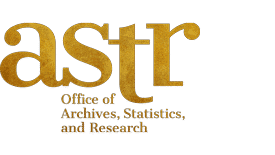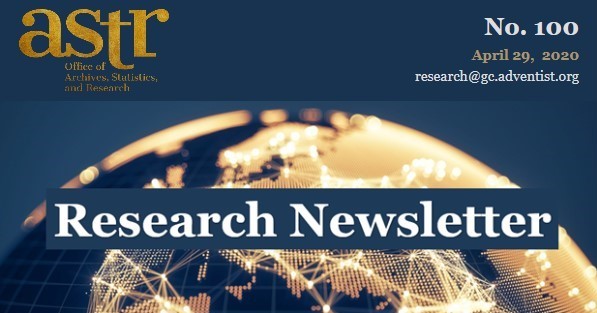
Where can you Find Adventist Research Data?
Have you ever been frustrated looking for some reliable figures on the Adventist Church or church-related projects without apparent success? Or have you been searching for some data through articles, surfing through internet pages, or asking those who were supposed to know all the references only to find out that information you have finally gotten was outdated and not relevant? If so, we have good news for you! The Adventist Research website is here to provide updated human-subject research data on the global Adventist Church. These data are available to you whether you are an Adventist Church administrator, pastor, researcher, or lay member. This website is here to inform you about recent developments, trends, and findings on Adventists around the world. There are also presentations, research blogs, reports, the Seventh-day Adventist Church’s strategic plans, and information about research conferences or summits. We believe that these data can help you and the Adventist Church become well-informed, visionary, and motivated to improve the current situation for better.
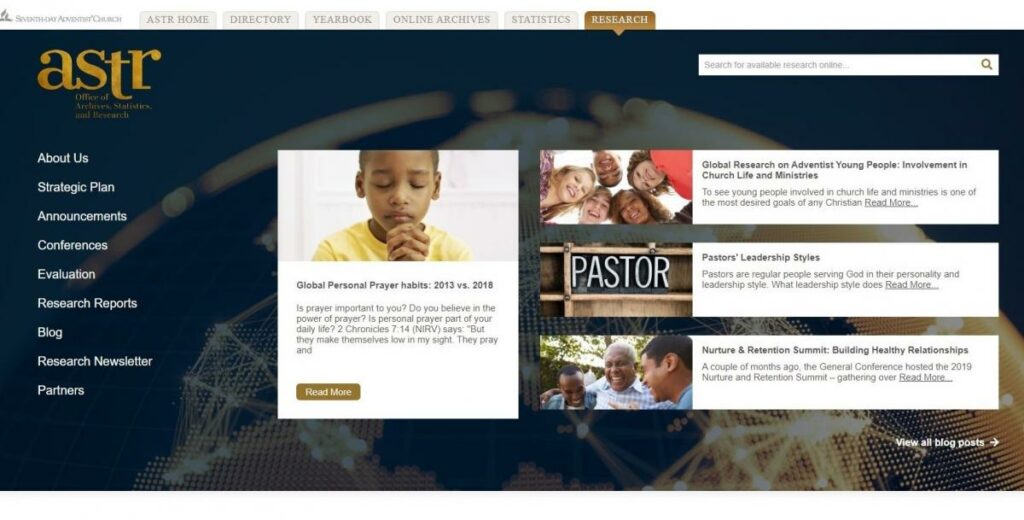
The Adventist Church has always valued data. From the very beginning, it collected and kept statistical records. The denominational Yearbook goes back to 1883 and while the Annual Statistical Report started only in 1907, yearly statistical reports have been compiled, reported to church leaders, and published in church papers since 1865.
From the 1960s, in addition to gathering statistics, church leaders started using research more often.((Michael L. Ryan, “Forward: Adventist Research and Strategic Planning” in Fresh Look at Denominational Research: Role, Impact, & Scope ed. by Petr Cincala (Berrien Springs, MI: Institute of Church Ministry, Andrews University, 2018), 5.)) Seeing benefits from the research, church leaders identified a need of consistent human-subject research for strategic planning and decision-making. Such an approach became a reality in the 21st century. The Adventist Church moved from sporadic use of Adventist research pioneers, such as Monte Sahlin, Roger L. Dudley, and Bailey Gillespie, towards creating an office in the General Conference (GC) with responsibility for a program of research. Initially, this was the Office of Assessment and Program Effectiveness, with Paul Brantley as its director, which from 2007 to 2011 conducted several global qualitative assessment projects. In 2011, this office was merged with the Office of Archives and Statistics, giving its name the third component; it became the Office of Archives, Statistics, and Research (ASTR), with David Trim as director.
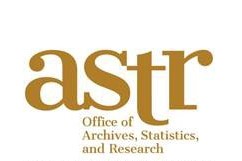
Since that time, strategic planning and human-subject research became an additional function in ASTR’s operations.
This development has opened a new page in Adventist history. The GC began to conduct strategic planning-related research and evaluation projects regularly on a global scale. In the last decade, tens of thousands of pastors, church leaders, active or former members, young people, and church employees have participated in global research projects. The biggest project that encompassed all divisions was the 2nd Global Church Member Survey (GCMS), with a total sample of 63,756 respondents. You can find its “Meta-Analysis Report” and other research reports here. The ASTR Research and Evaluation team also supervised evaluations of the mission-effectiveness of several major church ministries and organizations, including Adventist Review and Adventist World magazines, Hope Channel, Adventist World Radio, and SunPlus. It also developed a Mission-Effectiveness Evaluation handbook and manual for use by other church organizations in conducting evaluations, which include a Bible foundation and philosophy of evaluation and step-by-step guidelines for evaluating church ministries and organizations, including undertaking research.

It would not be possible to accomplish these global assignments without the professional expertise of Adventist researchers with whom ASTR contracts for research projects. However, a worldwide network of Adventist researchers was missing. Research teams in different divisions functioned separately, each on their basis, connected to respective educational institutions but without reference to other professionals with similar research interests. In 2012, ASTR conducted the first conference of Adventist social science researchers, which laid the foundation for the creation of the international Adventist Human-Subject Researchers Association (AHSRA). Its official organization took place at the 2013 Nurture & Retention Summit (also organized by ASTR), and since that time it has conducted annual meetings. (You can read more about the history of AHSRA and its conferences in an article by David Trim and Galina Stele.)((Galina Stele and David Trim, “ASTR, AHSRA, and New Horizons for Human-Subject Research” in Fresh Look at Denominational Research: Role, Impact, & Scope ed. by Petr Cincala (Berrien Springs, MI: Institute of Church Ministry, Andrews University, 2018), 5.))
ASTR has sought to share research data with church leaders, pastors, researchers, and lay members. For that reason, it created the Adventist research website, which is a part of the home ASTR website of this office. ASTR also started publishing bi-monthly research newsletters/blogs to inform about recent research projects and their findings.
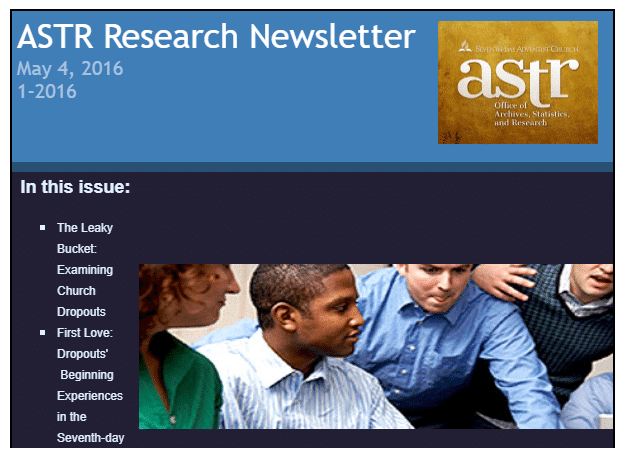
Our first Research Newsletter went out four years ago, in May 2016. This month, in April 2020, we issue our 100th Research Newsletter. In the last four years, we have been informing our readers via blogs about many global projects and data on church-related issues. The range of our topics is extensive. We have published blogs on data about pastors, their leadership styles, and their support. We reported on issues such as the views of young people (youth, pathfinders) on God’s law, a healthy lifestyle, devotional habits, their connection to the Adventist Church, and more. We wrote about findings on Adventist education, family worship, the nurture and retention of church members, and we shared data regarding Adventist doctrine, Adventist beliefs, and Ellen White. You can read all our published blogs here. All of the blogs are available in English, and additionally, many of them are in German, Portuguese, and Spanish versions, and we are currently looking to adding versions in other languages, too. If you would like to receive regularly the ASTR Research Newsletter with a blurb of the new blog and links to different language versions, please visit our Newsletter page and sign up for it.
As our website is becoming more and more a resource to researchers, pastors, church leaders, church members, and of course, students, we would like to give you a brief guide to what you can find there. There are several tabs on our research website. If you are looking for information on upcoming Adventist research conferences conducted by AHSRA, you can find such details under Announcements. If you are curious about what kind of research-related events the GC has organized or sponsored in the last few years and where to find material from these meetings, you can find them listed under the Conferences tab with links to the content of each conference. Research reports and research presentations of many relevant topics like discipleship, nurture and retention, health issues, Adventist young people, Church life and ministries, and on Ellen G. White are in the respective folders under the “Research Reports” tab.[3]
We believe that our data can help build the Seventh-day-Adventist Church into a beautiful “spiritual house” that consists of “living stones” and can strengthen its ministries, to the glory of Jesus Christ (1Peter 2:5, NIV).
“Suppose one of you wants to build a tower. Won’t you first sit down and estimate the cost to see if you have enough money to complete it? For if you lay the foundation and are not able to finish it, everyone who sees it will ridicule you, saying ‘This person began to build and wasn’t able to finish.’” (Luke 14:28-30, NIV).
We will be happy to receive your feedback on our blogs, research-related questions, or any suggestions. You can reach us at [email protected].
If you wonder what material can be found on the main ASTR website, please check this presentation on what and where it is located on the home ASTR website.
